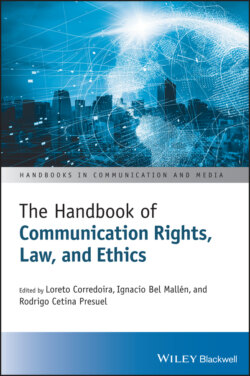Читать книгу The Handbook of Communication Rights, Law, and Ethics - Группа авторов - Страница 15
From Freedom of Expression to Communication Rights
ОглавлениеThe true sense of freedom can be understood when we consider it as a form in which a right is exercised – in this case, communication rights and their three facets (seek, receive, and impart) as these are analyzed in this work. In this way, the exercise of liberty can be understood perfectly as a way to facilitate the development of human rights, since rights cannot be exercised without freedom. The two concepts represent two sides of the same coin, though there is a substantial difference between them. Freedoms, particularly public ones such as freedom of expression or freedom to join a union or political party, are innate to man, yet they are regulated by the state by virtue of its authority to establish the extent of the freedom defined in its laws and regulations. From this perspective, freedom is a concession from the state, which becomes more democratic when it concedes more freedom, but which always retains the possibility of limiting freedom in the name of the so-called public good in order to protect other assets. This is the case, for example, with official and judicial secrets as well as with regulation of telecommunications.
In contrast to freedom, human rights are not conceded by the state nor do they have their origins in the state. They fall under the authority of humankind and are innate to it; they are born together with the individual and accompany that individual throughout their life. The role of the state is to recognize human rights in this way and protect the ability of individuals to exercise those rights. The exercise of human rights requires freedom, which must be conceded by the state in sufficient measure to allow a meaningful exercise of those rights. This is the double task of the state: to recognize rights and to guarantee their free exercise.
If society struggled initially to achieve desired levels of freedom, the struggle today is to make states recognize the rights of their people and protect the exercise of those rights. It is, and will remain, a difficult struggle, just as it was difficult to win freedom. Without a doubt, the day will come when eventually all rights will be recognized everywhere in the world. Communication, particularly information and communication technologies, has a role to play in achieving this objective; it serves as a reference point for people lacking, completely or partially, the human rights that are innate to them.
